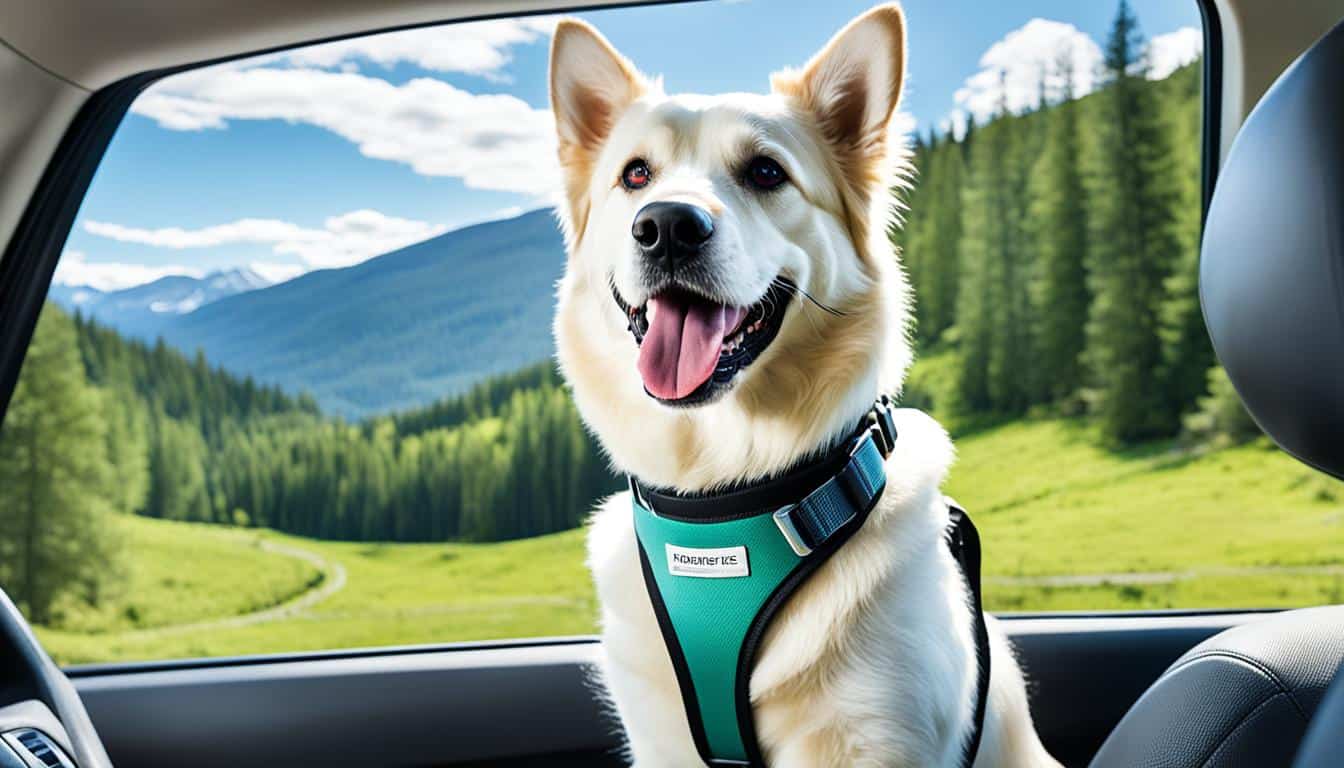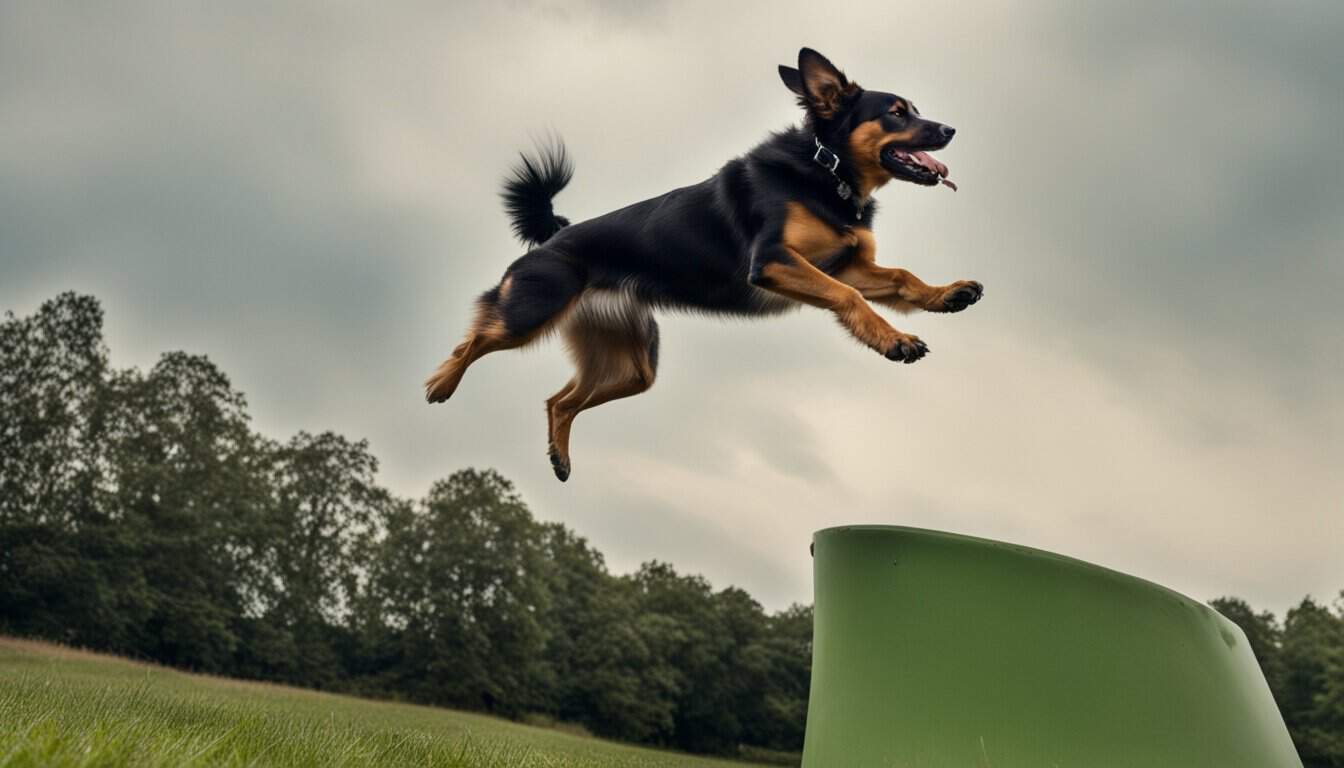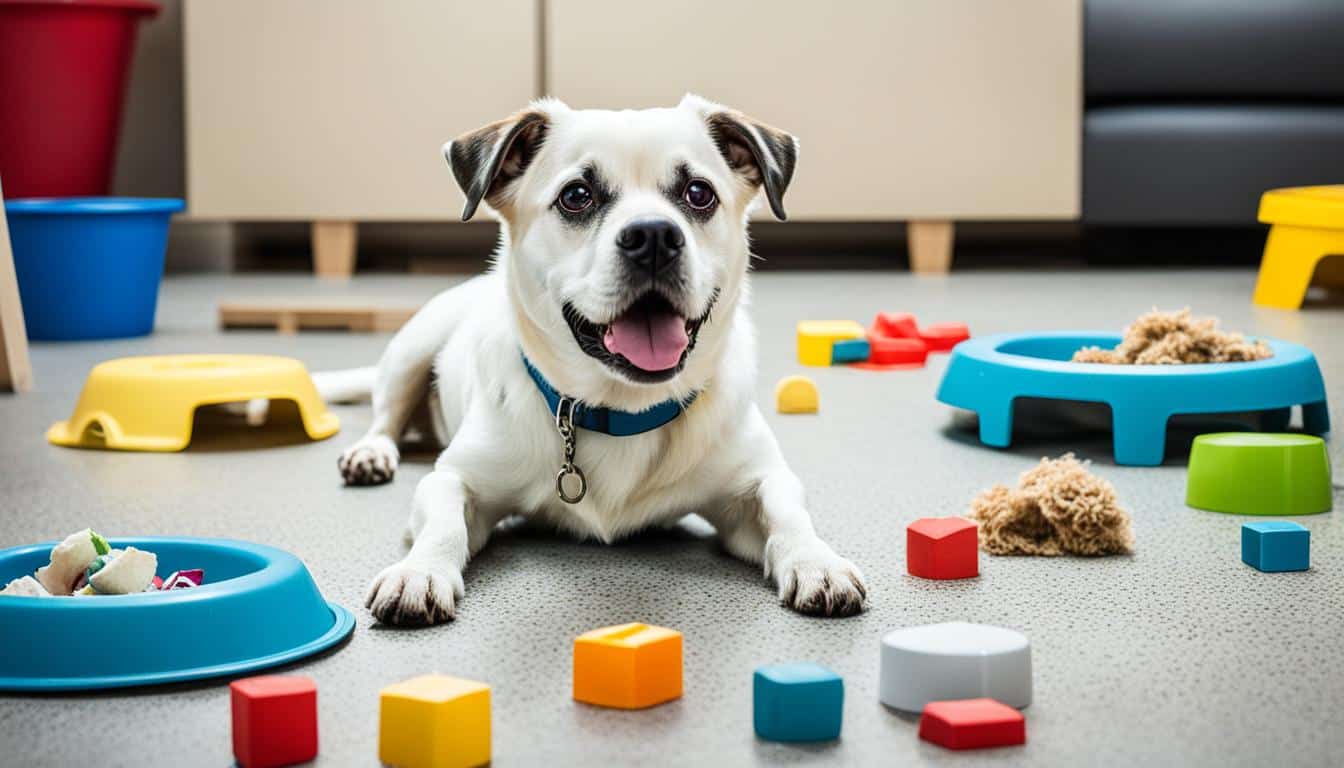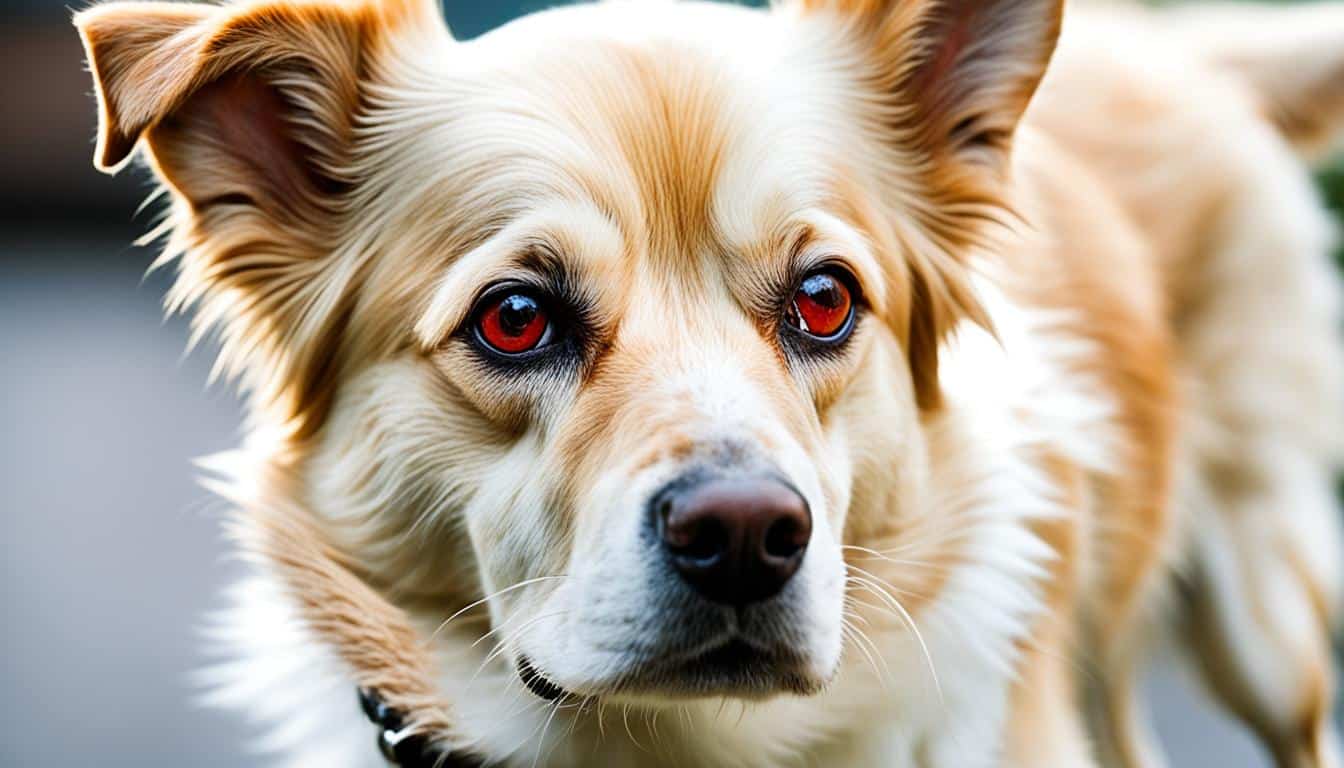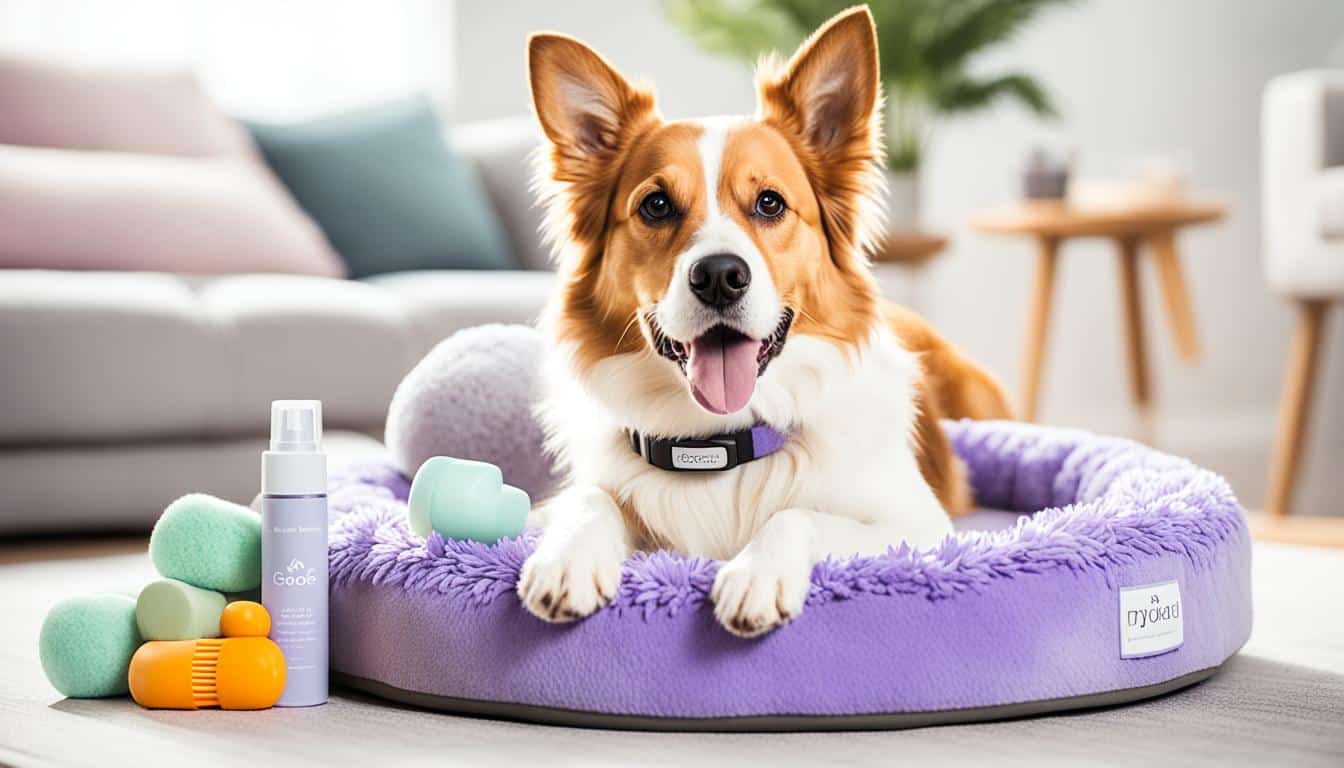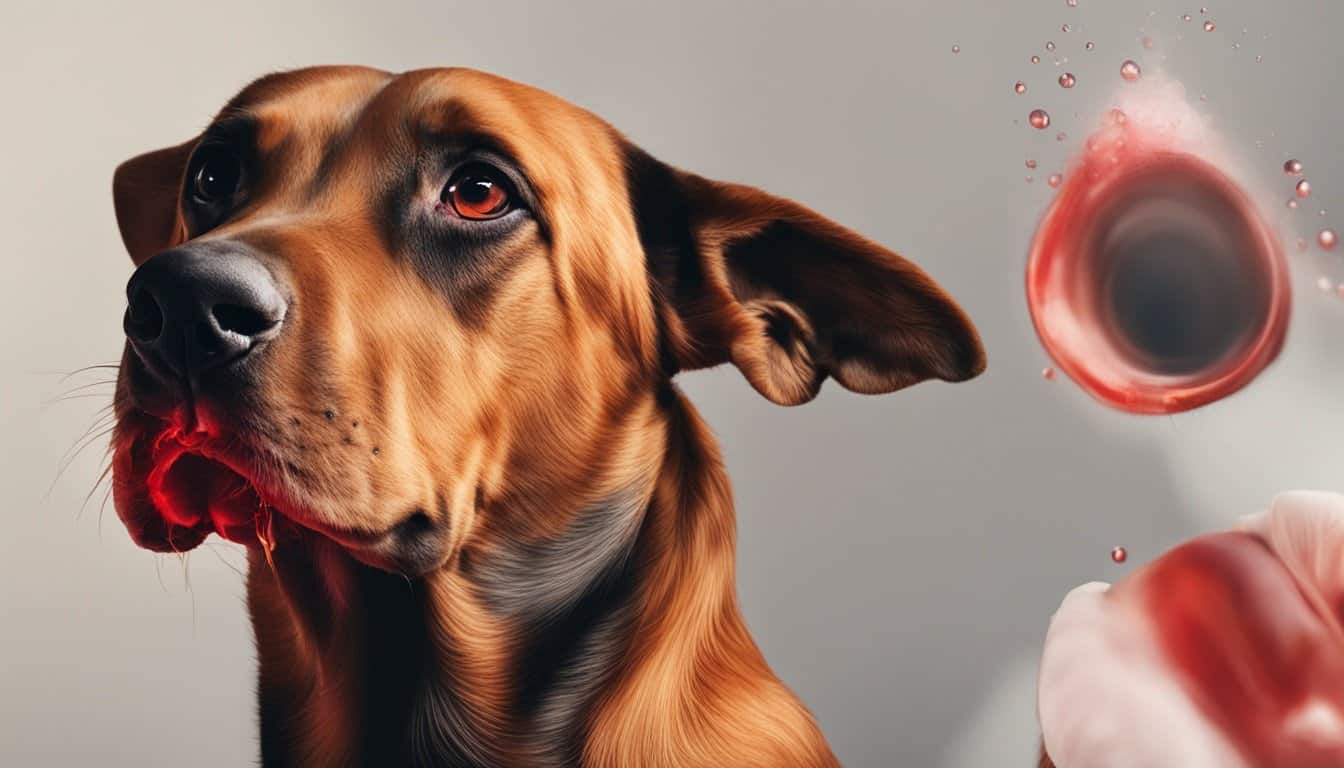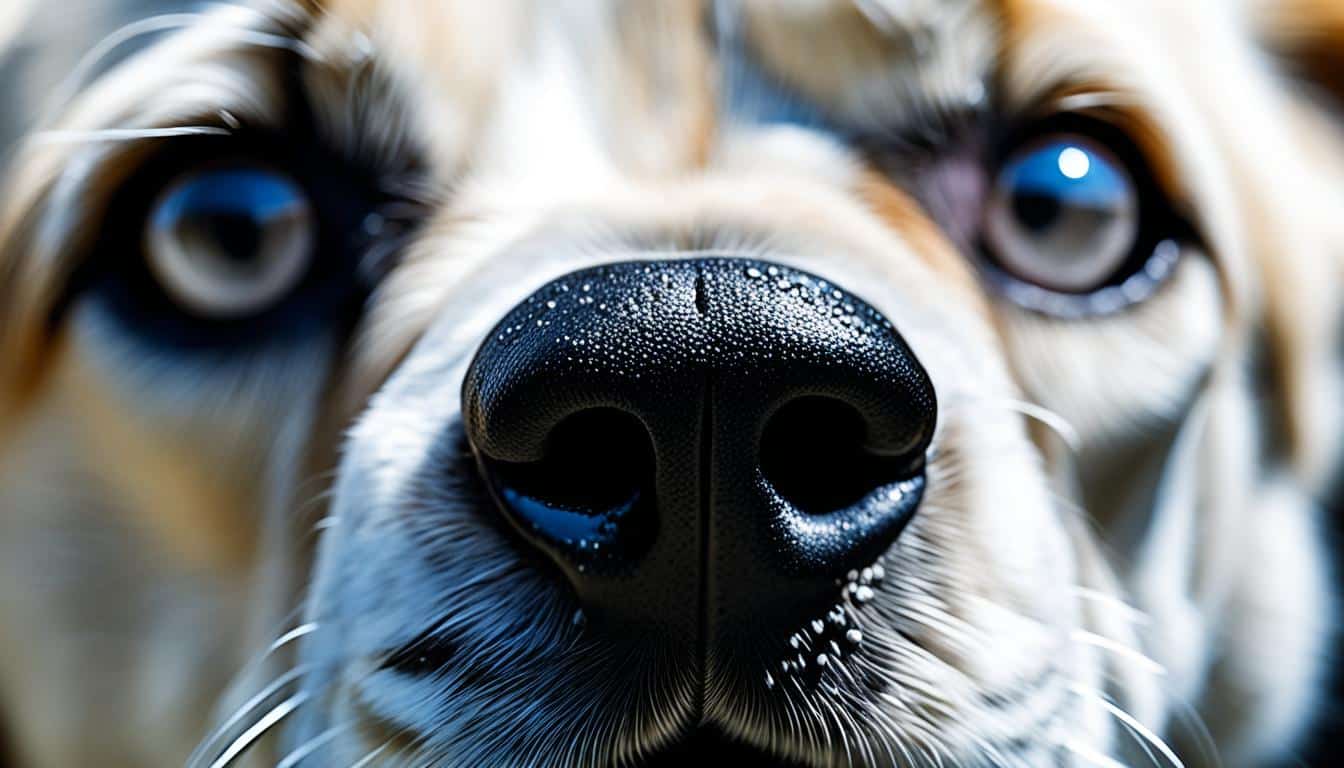Dogs, especially puppies and young ones, can get sick in cars. Their inner ear, not fully grown, might cause discomfort, anxiety, and vomiting during rides. Knowing how to prevent and treat car sickness is key for their happiness on the road.
Younger dogs get motion sickness more due to their developing balance system. Most puppies grow out of this by their first birthday1.
Dogs may also link car rides with unpleasant things like vet visits. This can make them more likely to feel sick1. To avoid this, gently get them used to car travel. Start with short trips, offer praise and snacks for staying calm, and make sure they’re comfy and secure2. A carrier or safety harness is a good idea to keep them safe2.
Planning ahead can lower the chance of your dog getting sick. Avoid giving food for 8 hours before the trip. But, make sure they have plenty of water to drink2. Keep the car cool, play soothing music, and bring their favorite toy to make them feel at ease2.
If your dog gets really anxious or sick, calming products or mild meds might help. Products like Adaptil® and safe medicines can calm them down. Always talk to your vet before giving any medicines2.
Some dogs might need stronger meds to avoid vomiting or feeling anxious. Your vet can prescribe medicine like Maropitant or Alprazolam. Start these meds a few days or weeks before your trip for the best effect2.
Medicines can help with car sickness, but it’s different for each dog. A talk with your vet is crucial. They might suggest special compounded meds for your dog’s needs1.
Key Takeaways:
- Motion sickness hits younger dogs harder because they’re still growing21.
- Getting dogs used to car travel gently can help them feel better2.
- Not feeding them right before and keeping them hydrated can lower sickness2.
- Carriers or safety harnesses, calm music, and cool temperatures make travel easier for them2.
- Vets might suggest calming aids or meds for anxious or sick dogs during rides21.
Symptoms of Dog Car Sickness
Dogs may show signs of sickness when they travel by car. It’s important for owners to know these signs. This helps make trips more enjoyable for their furry friends.
Common Symptoms of Dog Car Sickness:
- Whining
- Excessive drooling
- Lip licking
- Lethargy
- Vomiting
- Defecation
- Pacing
These symptoms mean the dog could be feeling sick from the motion of the car. It’s key to tackle these issues. Doing so makes sure the dog is happy and comfortable during trips.
According to studies3, it’s more common for puppies to get car sick. They might not have fully developed balance organs in their inner ear yet.
Recognizing these signs early is crucial. It lets owners take the right steps to ease their dog’s car sickness.
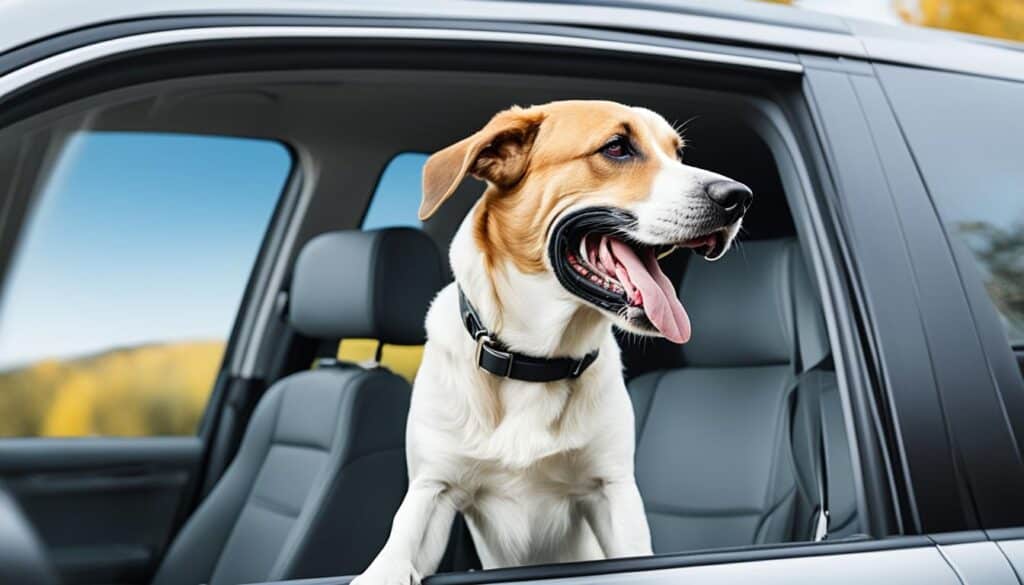
Note: The image above is just for show and may not show exact signs of dog car sickness.
How to Tell If Your Dog Has Motion Sickness
Your dog might get motion sick if you see some signs. These include whining, pacing around, drooling, licking their lips, feeling tired, throwing up, and even pooping. If these happen when your dog is in the car, they probably have motion sickness3.
Tips for Preventing Motion Sickness in Dogs
To make travel more fun for pets and their owners, there are ways to stop motion sickness in dogs. By following some tips, your dog won’t feel sick during car rides.
Gradually Desensitize Your Dog to Car Travel
Reference:2
Start by taking short car rides and slowly make them longer. This helps your dog get used to traveling in a car. They’ll be less likely to feel sick or scared.
Withhold Food Before Travel
Reference:2
Don’t feed your dog for about eight hours before a trip. A less full stomach means less chance of feeling nauseous.
Provide Access to Fresh Water
Reference:2
Make sure your dog stays hydrated during the journey. Give them plenty of fresh water. It helps keep them well and less upset by motion.
Use a Carrier or Harness
Reference:2
A carrier or dog safety harness can make your dog feel safer in the car. It gives them a cozy spot and eases their worry, reducing sickness risk.
Create a Calm and Quiet Car Environment
Reference:2
A peaceful car helps keep dogs calm. Avoid loud music and sounds. A quiet setting can prevent your dog from getting motion sickness.
Offer Special Toys or Scents from Home
Reference:2
Bring a toy or something that smells like home. It comforts your dog, distracts them, and may help stop motion sickness.
Consider Natural Remedies
Natural remedies like lavender, ginger, and valerian might calm your dog during trips. Always check with a vet before trying any new treatment to ensure it’s safe.
To wrap it up, stopping motion sickness is key for comfy car rides with your dog. Gradual trips, no food before traveling, keeping them hydrated, using harnesses, a calm environment, familiar items, and maybe natural remedies can all help.
Treating Motion Sickness in Dogs
If your dog gets sick while traveling, you can help. Start with short car rides and slowly make them longer2. This helps them get used to it. Make sure the car is comfy for them. Don’t feed them for up to 8 hours before traveling2, but let them drink water to avoid nausea2.
Give them toys or something that smells familiar to keep them calm2. A carrier or safety harness can keep them safe. It makes them feel secure, which can lessen their sickness2. Also, keep the car cool and play soft music for a soothing vibe2.
Sometimes, dogs need medicine for motion sickness. Vets may recommend Adaptil® pheromones, calming meds, or anti-nausea drugs2. Always check with a vet to find the best solution for your dog2.
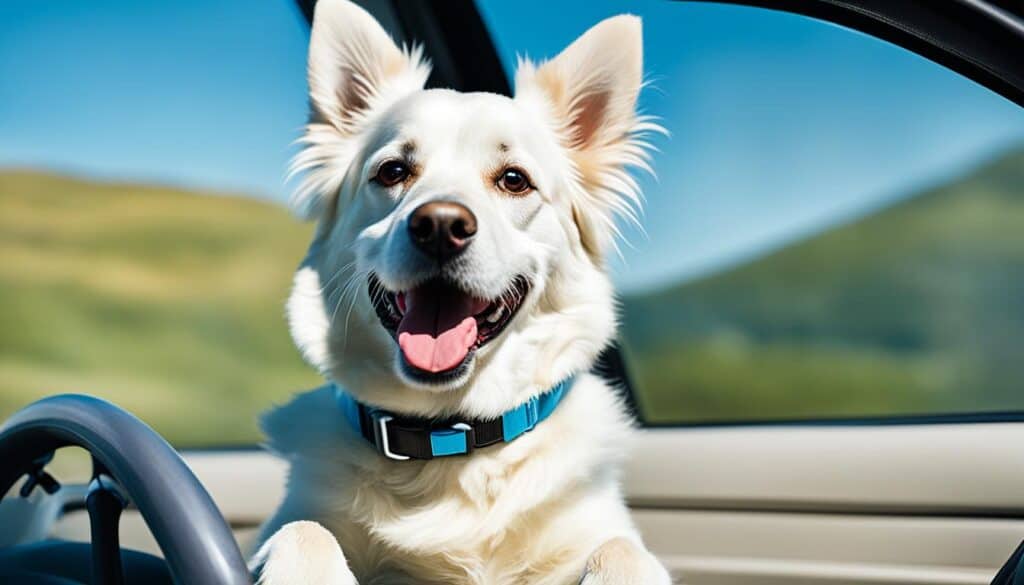
Causes of Dog Car Sickness
Dog car sickness comes from different reasons that make them feel bad when traveling. Knowing these reasons helps pet owners manage and stop their dogs from getting car sick.
Puppies and Underdeveloped Ear Mechanisms
Motion sickness is more common in younger dogs than in adults2. Puppies, like young kids, have not fully developed parts in their inner ears. These parts are needed for balance3. Because of this, puppies often get car sick.
Young puppies struggle with the feeling and movement of car rides. Their inner ear is not fully grown, which messes up their balance. This can make them feel sick and throw up4.
Anxiety and Negative Conditioning
Dogs that only travel by car a few times a year may feel anxious or sick2. Bad past experiences can also make them dread car rides.
Dogs can feel scared and have bad feelings about car rides if they had bad experiences before. Those bad memories can make them more stressed and sick during car travel3.
Medical Conditions and Medications
Some health problems and medicines make dogs more likely to get car sick. It’s vital to know about these if your dog gets sick from car rides.
WebMD says dogs get motion sickness when their sense of balance is upset by mixed signals during car trips4.
Mixed signals, like seeing and feeling movement differently, mess up a dog’s balance. This causes car sickness. Dogs with certain health issues or on certain medicines might have more trouble with car rides3.
To stop dog car sickness, pet owners can help by getting puppies used to car rides, making the car a comfortable place, and talking to a vet for medicines if needed.
| Causes of Dog Car Sickness | Statistics |
|---|---|
| Puppies and underdeveloped ear mechanisms | 2,3 |
| Anxiety and negative conditioning | 2,3 |
| Medical conditions and medications | 3,4 |
How to Help a Dog with Car Sickness
Helping a dog with car sickness involves several steps. Gradually getting them used to car travel can make trips more comfortable. Using positive vibes and treats helps too. This approach may need some time, but it’s effective.2
Before a car ride, it’s wise not to feed your dog for up to 8 hours. This reduces their chances of feeling sick. But, always make sure they have water to stay hydrated.2
Making the car feel calm and cool is key. Dogs react to their environment, so bring their favorite toys or blankets. Familiar smells and items can ease their stress.2
Tips for Helping a Dog with Car Sickness:
- Gradually desensitize your dog to car travel through positive reinforcement.
- Limit food intake for up to 8 hours before the journey.
- Provide access to fresh water to keep your dog hydrated during the trip.
- Use a carrier or dog safety harness to help anxious dogs feel more secure.
- Create a cool and calm environment in the car with familiar scents and toys.
For severe cases, medications or natural remedies might be needed. Always talk to a vet for the best advice. Options include Adaptil®, non-prescription anti-nausea meds, and medicines like Alprazolam. Always follow your vet’s instructions.2
Remember, your dog’s comfort and happiness come first. With your support, car rides can become fun, not scary. These strategies are steps towards your dog’s enjoying every journey.2
| Statistical Data | Reference Number |
|---|---|
| Motion sickness is more common in younger dogs than in adults. | 2 |
| Puppies often outgrow motion sickness by the time they are about 1 year old. | 2 |
| Dogs that travel infrequently may associate car rides with stress, leading to anxiety and nausea. | 2 |
| Signs of motion sickness in dogs include whining, drooling, licking lips, lethargy, vomiting, and defecation. | 2 |
| Desensitizing or counter-conditioning dogs to car travel can be achieved but may take several days or weeks. | 2 |
| Withholding food for up to 8 hours before travel can help reduce nausea in dogs. | 2 |
| Using a carrier or dog safety harness can help anxious dogs during travel. | 2 |
| Cool and quiet environments in the car, with the smell of home, can ease a dog’s travel anxiety. | 2 |
| Adaptil®, non-prescription medication, and anti-nausea medication are options to help dogs with travel anxiety. | 2 |
| Prescription anti-anxiety medications like Alprazolam or Trazodone may be considered for very stressed dogs before travel. | 2 |
Medications and Natural Remedies for Dog Car Sickness
If your dog gets car sick, there are many medications and natural remedies that can help. Always talk to a vet before you give any medication or supplement to your pet.
Prescription Medications:
Cerenia is FDA-approved to stop vomiting from motion sickness in dogs. It should be taken once a day5. Another choice is Meclizine, an over-the-counter medication, also given once daily5.
Over-the-Counter Options:
For over-the-counter relief, Benadryl and Dramamine can reduce car sickness. They are given every 8 hours5.
Herbal Supplements and Natural Remedies:
Natural remedies can also ease your dog’s car sickness. Adaptil, a calming spray, works well daily5. Lavender spray is another safe choice that can calm your dog in the car5. Some supplements might need to be taken daily for weeks to work best5.
It’s key to follow your vet’s advice and dosage when using any treatment. They know what’s best for your dog’s car sickness5.
| Medication/Remedy | Frequency |
|---|---|
| Cerenia (maropitant) | Once daily5 |
| Meclizine | Once daily5 |
| Benadryl | Every 8 hours5 |
| Dramamine | Every 8 hours5 |
| Adaptil | Daily5 |
| Lavender (spray form) | – |
“The right medications and natural remedies can provide relief for dogs suffering from motion sickness during car rides. Consult your veterinarian for the best options tailored to your dog’s needs.” – Statistics show that 48% of dog parents have noticed signs of motion sickness in their canine companions6.
Conclusion
Motion sickness is common in dogs, affecting 10%–16% of them. Puppies are the most at risk. They usually get better by the time they are 6 months old, but bigger dogs might take more time7. Most dogs stop feeling sick in the car within their first year7. Remember, it can take months for dogs to get used to travelling7.
To prevent motion sickness in dogs, start slowly. Begin with short car trips and then make them longer. This helps your dog get used to the car. Making the car a nice place, with things like their favorite blankets, can also help. Plus, talking to a vet can give you tips on medicines or natural ways to help your dog feel better on the road8.
With the right steps, your dog can start to enjoy car rides. It’s important to work out a plan that suits your dog’s needs with a vet. With a bit of effort, your dog can look forward to trips in the car78.
FAQ
How can I prevent car sickness in dogs?
To stop car sickness in dogs, gradually get them used to car trips. Start with short drives. Give praise and treats to make it fun.
Try not to feed them before you go. Always have water ready. Use a pet carrier or seat belt. Keep the car cool and don’t play loud music. Bring their favorite toys or something that smells like home.
What are the symptoms of dog car sickness?
Dogs show many signs of car sickness. They may whine, drool a lot, lick their lips, seem tired, throw up, or even have accidents. These behaviors mean your dog might not feel well when moving.
How can I tell if my dog has motion sickness?
Look for signs like whining, walking back and forth, drooling, licking their lips, being tired, vomiting, or having accidents. If your dog does these things in the car, they might have motion sickness.
What are some tips for preventing motion sickness in dogs?
You can stop motion sickness by slowly getting your dog used to being in a car. Begin with short rides. Don’t feed them right before a trip and give them water.
Keeping them secure, the car cool, and the sound low helps. Bring their favorite items for comfort. Talk to a vet about using products like Adaptil, herbal stuff, or medication to prevent sickness, but always ask a vet first.
How can I help a dog with car sickness?
Make car trips easy for them at first. Use positive steps to make them less worried and sick. A quiet, comfy car and not eating before travel help too.
Offer toys or something that smells familiar. Sometimes, a vet might suggest medicine or natural treatments for the sickness or worry.
What causes dog discovery?
Several things cause car sickness in dogs. Young pups often get it because their inner ear, which balances them, isn’t fully developed.
Stress or bad past experiences with cars can also make them sick. And, some health issues or medicines might make them feel nauseous during rides.
How can I help a dog with car sickness?
Helping a dog with car sickness starts with gentle car trips. Positive reactions from you can reduce their fear. Limit their food before going out, and make the car a calm space.
Stuff they know, like toys or blankets, might ease their stress. Your vet can also suggest medicine or natural aids for upset stomach or anxiety.
Are there any medications or natural remedies that can help with dog car sickness?
Yes, there are treatments for dog car sickness. Your vet might recommend special medicines, like Cerenia, or common ones, like Dramamine or Benadryl.
Herbs like ginger or lavender might help too. Always check with your vet before you try something new and follow their advice closely.
How can I prevent motion sickness in dogs?
Dealing with motion sickness in dogs is possible with the right steps. Slow exposure to driving, a peaceful car, and familiar items can comfort them.
Sometimes, a vet’s prescribed remedies are needed. Talking to a vet is key in finding out what’s best for your dog. With care, dogs can start to enjoy rides with their families.
Source Links
- https://www.wedgewood.com/blog/posts/10-ways-to-minimize-motion-sickness-in-your-dog.html
- https://vcahospitals.com/know-your-pet/motion-sickness-in-dogs
- https://www.akc.org/expert-advice/health/car-sickness-in-dogs/
- https://www.fourpaws.com/pets-101/health-and-wellness/dog-car-sickness
- https://www.petmd.com/dog/conditions/digestive/c_dg_motion_sickness
- https://toegrips.com/dog-car-sickness-remedies/
- https://www.dogster.com/dog-health-care/dog-car-sickness
- https://www.pdsa.org.uk/pet-help-and-advice/pet-health-hub/conditions/car-sickness-and-motion-sickness-in-dogs






